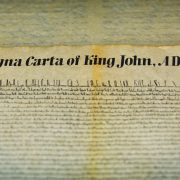Hayek and the Lasting Importance of the Rule of Law
Young Americans like myself have come of age in a climate where arbitrary rule has steadily become the norm. Civil liberties, once guaranteed by the Bill of Rights, are now conditional; they are regularly disregarded in the pursuit of a specific end.
The war on terror, for example, ushered in an era where the government was given the power, or rather gave itself the power, to do anything it needed in order to keep the country secure. As long as the state’s violations against our inalienable rights were done in the name of national security, or prosperity, they were considered just, necessary even.
The Constitution that was specifically intended to protect the American people against this kind of rule has now just become a list of suggestions. President Bush is even rumored to have referred to it as a “goddamn piece of paper,” when confronted about his refusal to act within its bounds during the height of the War on Terror.
And in the wake of this “anything goes” rhetoric, the War on Terror was and continues to be used to suspend free speech, restrict travel, detain American citizens indefinitely, and even defend the American President’s use of a “secret kill list.”
It was with this jaded view of government restraint that I began reading the Sixth Chapter of The Road to Serfdom. Hayek uses this chapter to dig into the concept of the rule of law.
Hayek’s Day
Initially, I was surprised to find Hayek’s enthusiastic support of the belief that a government is capable of limiting itself within legal boundaries. I attributed this to modern hindsight. How on earth could Hayek know that the September 11th attacks would all but demolish the rule of law in this country?
But Hayek watched Hitler rise to power through constitutional means. He was no stranger to the very real possibility of arbitrary rule. Something he is certain to point out:
It may well be that Hitler has obtained his unlimited powers in a strictly constitutional manner and that whatever he does is therefore legal in the judicial sense. But who would suggest for that reason that the Rule of Law still prevails in Germany?
And yet, even though Hayek acknowledges its shortcomings, he still shows a great deal of reverence towards this oft-disregarded concept.
But this respect, while possibly naive, is not unfounded. Even if our government no longer adheres to the rule of law, it was an idea completely unheard of prior to the rise of classical liberalism. And without the rule of law, it is certain that mankind would have already succumbed to absolute despotism.
Credit Where Credit is Due
The concept of the rule of law was integral in the history of human progress. And not just in western civilization. Even though it may not have worked as well in practice as it did in theory, its implications were nothing short of revolutionary.
In 1215, when the landholding barons led an uprising and forced King John to sign the great charter, or the Magna Carta as history would come to know it, the rule of law experiment officially began. And the world was well on its way to finding out whether or not a king or some other authority could be tamed by written laws.
This idea floated around for a few centuries and was tried to varying degrees until it became a preoccupation for many classical liberal scholars. If the actions of state authority could not only be limited, but also predicted, the individual would be able to maintain his freedom, or so they thought.
So important was this principle to the concept of individual liberty, Hayek even claims that it is an essential feature of any country claiming to be free from tyranny.
Nothing distinguishes more clearly conditions in a free country from those in a country under arbitrary government than the observance in the former of the great principles known as the Rule of Law. Stripped of all technicalities, this means that government in all its actions is bound by rules fixed and announced beforehand—rules which make it possible to foresee with fair certainty how the authority will use its coercive powers in given circumstances and to plan one’s individual affairs on the basis of this knowledge.
Thomas Jefferson expressed a similar sentiment during the time of America’s founding saying:
The two enemies of the people are criminals and government,
so let us tie the second down with the chains of the Constitution
so the second will not become the legalized version of the first.
It is important to understand that this idea had never been tried before in human history. The idea that a ruler would restrict his or her power seemed completely unfounded. Especially since prior to the American Revolution, the “divine right of kings” doctrine was so steadfastly believed.
Since a King was allegedly anointed by God, his word was beyond contestation. The only referee between the people and their ruler was God. And unfortunately, only the king had his direct line.
Given this bleak situation, you can imagine how empowering it must have been to be given the opportunity to live in a land where the ruler was bound, not just by fallible men, but by concrete doctrine.
The idea that government ought to be bound by written laws was pivotal to the American founding. It is what inspired our written Constitution and specifically, our Bill of Rights. A list of things government cannot do. And while in hindsight we might see that its power to restrain government has been exaggerated, it did change the world.
Dead Letter Law
It’s easy to lambaste Bush for calling the Constitution nothing but a piece of paper. But in a sense, he was correct. The Bill of Rights has become dead letter. When the people stop valuing the liberties that the law is supposed to protect, the entire system crumbles because no one is holding government accountable.
The Second Amendment, for example, is an explicit limitation on our government. By encouraging an armed populace, it also encourages politicians to stay within their limits for fear of just rebellion.
Yet today, the history behind the right to bear arms is disregarded as unimportant, unnecessary, and even dangerous. Without the ideological substance to back these ideas we seek to bind our leaders to, there can be no follow through. Each right we relinquish is a right we may never get back.
So while governments may always be looking for ways to violate the rule of law, it is important that as individuals we remember to keep them accountable as much as is humanly possible.









